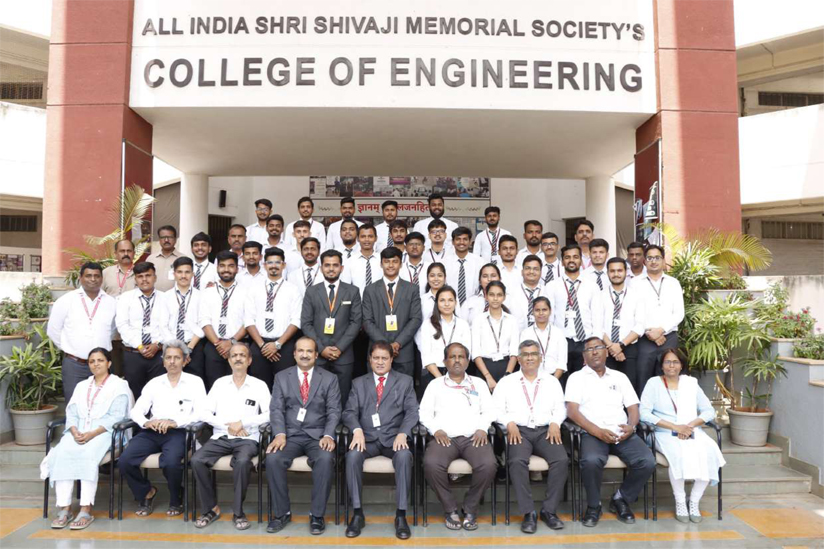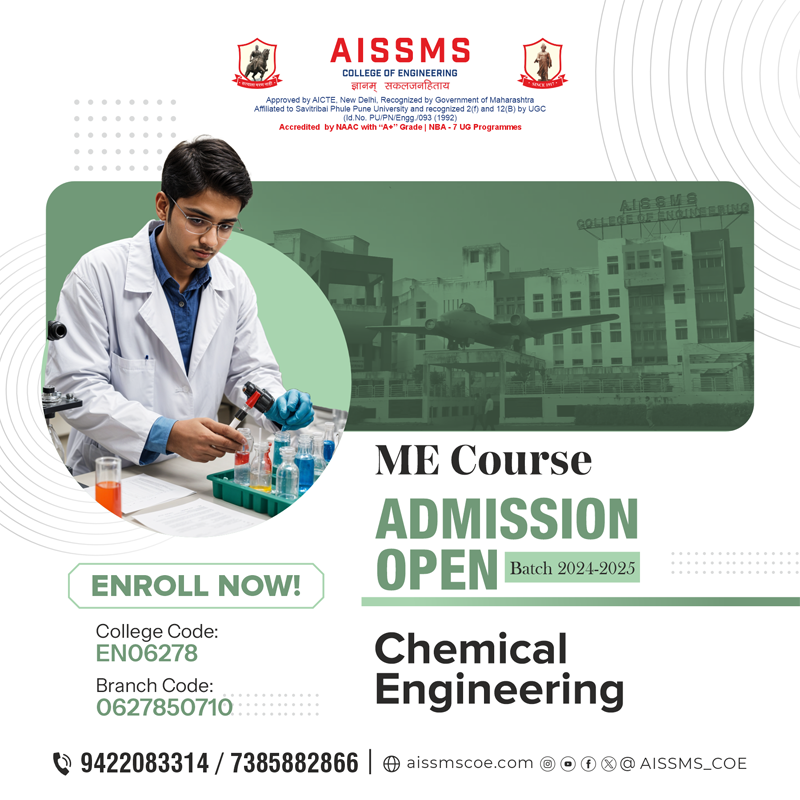


Department Information:
Department of Chemical Engineering conducts under-graduate (UG), post-graduate (PG) and doctoral (PhD) programs in Chemical Engineering.
BE Chemical Engineering, four-year undergraduate program was started in 1996. It has evolved steadily since then and made significant strides in terms of infrastructure, faculty expertise, student excellence and research activities. Savitribai Phule Pune University (SPPU) has awarded permanent affiliation status for the BE program.
ME Chemical Engineering program was started in 2011 to cater to the demand of Industry and R & D establishments.
The PhD Chemical Engineering program was started in 2014-23 to enhance the research activities in the department.
Intake of Chemical Engineering Department:
| Undergraduate & Postgraduate | Annual Intake | ||
|---|---|---|---|
| UG | PG | Research Centre(Ph.D) |
|
| Chemical Engineering | 60 | 09 | 20 |
Vision:
- To be a leader in Chemical Engineering education providing service to society
Mission:
- To prepare graduates for responsible positions in chemical industry, academia and research.
- To prepare graduates to analyze and solve problems of chemical industry, academia and research.
- To strengthen industry-institute interaction to develop industry oriented attributes like attitude, soft skills, team work and leadership.
Long Term and Short Term Goals of Department:
Short Term Goals:
- Modernize laboratory and software infrastructure
- Enhance academic performance of students
- Improve Industry-Institute Interaction
Long Term Goals:
- Improve placement in core industries
- Obtain research grants from funding agencies
- Collaborate with industry for joint research
- Provide consultancy
Program Outcomes (PO)
Engineering Graduates will be able to:
- Engineering knowledge: Apply the knowledge of mathematics, science, engineering fundamentals, and an engineering specialization to the solution of complex engineering problems.
- Problem analysis: Identity, formulate, review research literature, and analyze complex engineering problems reaching substantiated conclusions using first principles of mathematics, natural sciences, and engineering sciences.
- Design/development of solutions: Design solutions for complex engineering problems and design system components or processes that meet the specified needs with appropriate consideration for the public health and safety, and the cultural, societal, and environmental considerations.
- Conduct investigations of complex problems: Use research-based knowledge and research methods including design of experiments, analysis and interpretation of data, and synthesis of the information to provide valid conclusions.
- Modern tool usage: Create, select, and apply appropriate techniques, resources, and modern engineering and IT tools including prediction and modeling to complex engineering activities with an understanding of the limitations.
- The engineer and society: Apply reasoning informed by the contextual knowledge to assess societal, health, safety, legal and cultural issues and the consequent responsibilities relevant to the professional engineering practice.
- Environment and sustainability: Understand the impact of the professional engineering solutions in societal and environmental contexts, and demonstrate the knowledge of, and need for sustainable development.
- Ethics: Apply ethical principles and commit to professional ethics and responsibilities and norms of the engineering practice.
- Individual and teamwork: Function effectively as an individual, and as a member or leader in diverse teams, and in multidisciplinary settings.
- Communication: Communicate effectively on complex engineering activities with the engineering community and with society at large, such as, being able to comprehend and write effective reports and design documentation, make effective presentations, and give and receive clear instructions.
- Project management and finance: Demonstrate knowledge and understanding of the engineering and management principles and apply these to one’s own work, as a member and leader in a team, to manage projects and in multidisciplinary environments.
- Life-long learning: Recognize the need for, and have the preparation and ability to engage in independent and life-long learning in the broadest context of technological change.
Program Specific Outcomes (PSO)
Chemical Engineering graduates will be able to:
- Identify, analyze, design and develop solutions to Chemical Engineering problems of practical importance to industry and society.
- Demonstrate sound understanding of Chemical engineering fundamentals to solve problems through the use of modern experimental methods, computer aided design and simulation software.
Program Educational Objectives (PEOs):
1: Competency: To prepare competent graduates in Chemical Engineering so that they are successful in their professional career in industry, academia or research.
2: Problem Solving Skills: To prepare graduates who can identify, analyze, research and solve Chemical Engineering problems of practical importance to industry, academia or research.
3: Leadership Skills: To prepare graduates with effective communication, teamwork and leadership skills so that they can play effective role in industry, academia and research institutes.
Course Outcomes
Areas for ongoing research work:
- Process Intensification
- Process Modeling and Simulation
- Process Development
- Waste Water Treatment
- Reaction Engineering
- Separation Processes
- Energy and Environmen
Salient Features of the BE and ME programmes:
- Well-equipped laboratories with advanced analytical instruments
- Dedicated faculty members with experience from Industry and Research
- Innovative Teaching- Learning Methodology with continuous assessment of student’s performance
- Computational and Simulation software available to solve problems numerically
- Students ranked in University Results
- Well-equipped project laboratory for research
- Research by students on funded research projects
- Every year students excel in GATE, GRE and CAT /CET with many students pursuing post- graduate programs in Engineering/Management in India and abroad.
All Round Development of Students through:
- Monthly presentations on project progress and seminar.
- Guest faculty is invited to impart Soft Skills training to students
- Every student undergoes in-plant training in industries compulsorily followed by presentations.
- Industry visits are organized every semester.
- Guest lectures /seminars /workshops are organized to cover advanced and emerging areas of Chemical Engineering which are beyond the purview of regular syllabus
- Participation in events (sports, technical & cultural) organized by various reputed institutes across India
Library facilities:
- Accessibility of online journals for easy reference in project and seminars.